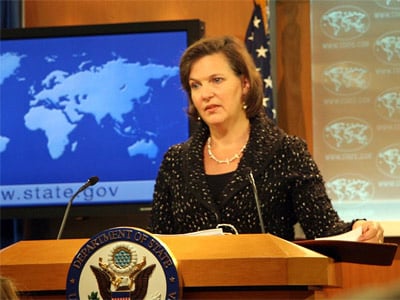
Jacob Heilbrunn
.
It is good to know that Victoria Nuland, Assistant Secretary of State for European Affairs, is not shy about venting her frustrations with the European Union. Like not a few British conservatives or French farmers or Italian cheesemakers, she seems to have a healthy appreciation for the vexations associated with Brussels. "Fuck the EU," she pithily declares in a new YouTube video that is causing a diplomatic brouhaha. The video, which may have been edited and which appears to disclose a conversation between Nuland and Geoffrey Pyatt, the U.S. ambassador to Ukraine, suggests that Nuland and the Obama administration have been machinating to create a new and improved Ukrainian government. Meanwhile, tempers are running hotter than ever in Moscow, where Kremlin adviser Sergei Glazyev is saying that Ukrainian president Viktor Yanukovych should just get it over with and crush the "putschists."
Rather than focus on the contents of the video, the Obama administration is complaining about dirty tricks in Moscow. While Edward Snowden could hardly have been the culprit, the video more than likely came from Russia without love. Nuland is in Kiev this Thursday meeting with Yanukovych to discuss matters like the future of his country, which is alternately being wooed and threatened by both Moscow and Washington. Which way should he turn? As he heads toward the winter Olympics, one of the perks of being president, Yanukovych adopted a lofty tone, saying that the crisis can only be solved by "dialogue and compromise."
But the implications of the phone call for America are not to be underestimated. For one thing, it reveals the extent to which the Obama administration is determined not simply to bring the crisis to an end, but also to install a government that it regards as appropriate. White House press spokesman Jay Carney says,
It's certainly no secret that our ambassador and assistant secretary have been working with the government of Ukraine, with the opposition, with business and civil society leaders to support their efforts to find a peaceful solution through dialogue and political and economic reform. Ultimately, it's up to the Ukrainian people to decide their future.
This is piffle. Nuland's comments show why. Should Ukrainian opposition leader Vitali Klitschko become part of a new government? No, says Nuland. He wouldn't get along with another opposition leader, Arseniy Yatsenyuk. Nuland announces, "I don't think it's necessary. I don't think it's a good idea." But it's also not a good idea when the U.S. government gets down into the weeds to determine the composition of a new government, especially when the stakes include ousting, or altering, a democratically elected one. Given that Washington has been accusing Moscow of meddling in internal Ukrainian affairs, it's more than a little ironic that it is doing just that. Senator John McCain, for example, said recently:
In recent months, President Putin has pulled out all the stops to coerce, intimidate and threaten Ukraine away from Europe. This pattern of behavior amounts to a Russian bid for a kind of quasi-imperial dominance over its neighbors, a newfound assertiveness that has only grown in the void left by the administration’s absence of leadership in other parts of the world, especially Syria.
But aren't Ukrainians supposed to determine their own destiny? Isn't that what this is supposed to be all about? Or is it the job of the American ambassador to act as a local potentate, choosing who does, and does not, get to serve in a coalition government?
Not a chance.
What's more, the fact that the Russians were apparently able to monitor the private conversations of American officials with ease should cause more than a little heartburn in the Obama administration. Maybe Nuland and Pyatt were talking on an unsecured line, but that too would raise a host of questions. For his part, President Obama has resisted any reforms, as far as possible, of the National Security Agency. But the more we learn, the more incompetent American intelligence looks. It can neither process the vast volumes of information that it is collecting nor protect official conversations from scrutiny. America has constructed an intelligence Maginot line.
The kerfuffle over Nuland's remarks will go away. But they do provide a glimpse into the conduct of American foreign policy. The louder the Obama administration declares that it isn't meddling in the affairs of the Ukraine, the more certain you can be that it is.



.jpg/250px-ElbeDay1945_(NARA_ww2-121).jpg)





